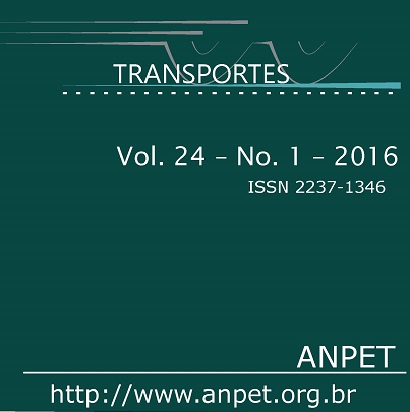.
DOI:
https://doi.org/10.14295/transportes.v24i1.975Keywords:
Public Transport, Multiobjective combinatorial optimization, Pareto-based Selection Algorithm.Abstract
The integrated vehicle and crew scheduling problem is a hard, widely studied Combinatorial Optimization problem over the years. Taking into consideration the range of variables related to the planning process of vehicles and drivers, there are several practical characteristics of the problem that are not reflected in the solutions generated computationally. The existing models focus on minimizing costs. However, other objectives must be considered as for example the reduction of meal breaks for the crews. This paper aims at presenting a multiobjective approach for the integrated vehicle and crew scheduling problem in public transport systems based on Genetic Algorithms. Computational results with real instances are presented and discussed. These results indicate that this new approach has a considerable potential for achieving significant gains in terms of operation costs and reduction in planning times.Downloads
References
Baita, F.; Pesenti, R.; Ukovich, W. e Favaretto, D. (2000) A Comparison of Different Solution Approaches to the Vehicle Scheduling Problem in a Practical Case. Computers & Operations Research, v. 27, p. 1249–1269.
DOI: 10.1016/S0305-0548(99)00073-8
Ball, M., Bodin, L. e Dial, R. (1983) A Matching Based Heuristic for Scheduling Mass Transit Crews and Vehicles. Transportation Science, v. 17, p. 4–31.
Bartodziej, P., Derigs, U., Malcherek, D. e Vogel U. (2007) Models and Algorithms for Solving Combined Vehicle and Crew Scheduling Problems With Rest Constraints: an Application to Road Feeder Service Planning in Air Cargo Transportation. OR Spectrum, v. 31, p. 405–429. Disponível em:
<http://link.springer.com/article/10.1007%2Fs00291-007-0110-7>
Acesso em: 12 ago. 2015.
Beasley, J. E. e Chu, P.C. (1998) Constraint Handling in Genetic Algorithms: the Set Partitioning Problem. Journal of Heuristics, v. 11, p. 323–357. DOI: 10.1023/A:1008668508685
Ceder, A. (2002) Urban transit scheduling: framework, review and examples. Journal of Urban Planning and Development, v. 128, p. 225–244. DOI: 10.1061/(ASCE)0733-9488(2002)128:4(225)
Corne, D. W.; Knowles, J. D.; Oates, M. J. (2000) The Pareto Envelope-based selection algorithm for multiobjective optimization. Proceedings of sixth International Conference on parallel problem solving from Nature, Paris, 2000. Disponível em: <http://link.springer.com/chapter/10.1007%2F3-540-45356-3_82>
Acesso em: 12 ago. 2015.
Corne, D. W.; Jerram, N. R.; Knowles, J. D.; Oates, M. J. (2001) PESA-II: Region-based selection in evolutionary multiobjective optimization. Proceedings of the Genetic and Evolutonary Computation Conference (GECCO–2001), San Francisco. Disponível em: <https://www.macs.hw.ac.uk/~dwcorne/pesaII.pdf> Acesso em: 12 ago. 2015.
Daduna, J. R. e Paixão, J. M. P. (1995) Vehicle Scheduling for public mass transit – an Overview. In: Daduna, J. R., Branco, I. e Paixão, J. M. P. (Eds.) Computer-Aided Transit Scheduling, Lecture Notes in Economics and Mathematical Systems, Springer, v. 430, p. 76–90.
Deb, K. Multi-objective optimization using evolutionary algorithms. Chichester: John Wiley & Sons, 2001.
Dias, M. T. G. (2005) A new approach to the bus driver scheduling problem using multiobjective genetic algorithms. Ph.D. Thesis (Doctorate in Engineering Sciences). Faculty of Engineering, University of Porto, Porto. Disponível em: <https://repositorio-aberto.up.pt/bitstream/10216/11426/2/Texto%20integral.pdf> Acesso em: 12 ago. 2015.
Falkner, J. C. e Ryan, D. M. (1992) Express: Set Partitioning for Bus Crew Scheduling in Christchurch. In: Desrochers, M. e Rosseau, J. M. (Eds.) Computer-Aided Transit Scheduling: Proceedings of the Fifth International Workshop, Springer, p. 359–378.
Fischetti, M., Lodi, A., Martello, S. e Toth, P. (2001) A Polyhedral Approach to Simplified Crew Scheduling and Vehicle Scheduling Problems. Management Science, v. 47, p. 833–850. DOI: 10.1287/mnsc.47.6.833.9810
Fleurent, C. e Rosseau, J. M. (2007) Integrated Vehicle and Crew Scheduling in Practice. In: Technical Report GIRO, Montreal.
Freling, R., Wagelmans, A. P. M. e Paixão, J. M. P. (1999) An Overview of Models and Techniques for Integrating Vehicle and Crew Scheduling. In: Wilson, N. H. M. (ed.) Computer-aided Transit Scheduling, Lecture Notes in Economics and Mathematical Systems, Springer, v. 471, p. 441–460, Springer.
Freling, R., Huisman, D. e Wagelmans, A.P.M. (2001) Applying an Integrated Approach to Vehicle and Crew Scheduling in Practice. In: Voβ, S. e Daduna, J. R. (eds.) Computer-aided Transit Scheduling, Lecture Notes in Economics and Mathematical Systems, Springer, v. 505, p. 73–90.
Freling, R., Huisman, D. e Wagelmans, A. P. M. (2003) Models and Algorithms for Integration of Vehicle and Crew Scheduling. Journal of Scheduling, v. 6, p. 63–85. Disponível em:
<http://link.springer.com/article/10.1023%2FA%3A1022287504028>
Acesso em: 12 ago. 2015.
Friberg, C. e Haase, K. (1999) An Exact Branch and Cut Algorithm for the Vehicle and Crew Scheduling Problem. In: Wilson, N. H. M. (ed.) Computer-aided Transit Scheduling, Lecture Notes in Economics and Mathematical Systems, Springer, v. 471, p. 63–80.
Gaffi, A. e Nonato, M. (1999) An Integrated Approach to Ex-urban Crew and Vehicle Scheduling Problem. In: Wilson, N. H. M. (ed.) Computer-aided Transit Scheduling, Lecture Notes in Economics and Mathematical Systems, Springer, v. 471, p. 103–128.
Groot, S. W. e Huisman, D. (2008) Vehicle and Crew Scheduling: Solving Large Real-World Instances with an Integrated Approach. In: Hickman, M. Mirchandani e Voβ, S. (eds.) Computer-aided Transit Scheduling, Lecture Notes in Economics and Mathematical Systems, Springer, v. 600, p. 43–56. Disponível em:
<http://link.springer.com/chapter/10.1007%2F978-3-540-73312-6_3>
Acesso em: 12 ago. 2015.
Haase, K., Desaulniers, G. e Desrosiers, J. (2001) Simultaneous Vehicle and Crew Scheduling in Urban Mass Transit Systems. Transportation Science, v. 35, p. 286–303. DOI: 10.1287/trsc.35.3.286.10153
Huisman, D. (2004) Integrated and Dynamic Vehicle and Crew Scheduling. Tese (Doutorado), Tinbergen Institute, Erasmus University Rotterdam, Rotterdam. Disponível em:
<http://repub.eur.nl/pub/6779/few_huisman_20040220.pdf>
Acesso em: 12 ago. 2015.
Huisman, D., Freling, R. e Wagelmans, A.P.M. (2005) Multiple-depot Integrated Vehicle and Crew Scheduling. Transportation Science, v. 39, p. 491–5025. Disponível em:
<http://pubsonline.informs.org/doi/abs/10.1287/trsc.1040.0104>
Acesso em: 12 ago. 2015.
Klabjan, D., Johnson, E. L., Nemhauser, G. L., Gelman, E. e Ramanaswamy, S. (2001) Solving Large Airline Crew Scheduling Problems: Random Pairing Generation and Strong Branching. Computational Optimization and Applications, v. 20, p. 73–91. DOI: 10.1023/A:1011223523191
Kliewer, N., Amberg, B., e Amberg, B. (2012) Multiple Depot Vehicle and Crew Scheduling with Time Windows for Scheduled Trips. Public Transport, v. 3, p. 213–244. DOI: 10.1007/s12469-011-0049-6
Konak, A.; Coit, D. W. e Smith, A. E. (2006) Multiobjective Optimization Using Genetic Algorithms: a Tutorial. Reliability Engineering and System Safety, v. 91, p. 992–1007.DOI: 10.1016/j.ress.2005.11.018
Laurent, B. e Hao, J.K. (2007) Simultaneous Vehicle and Driver Scheduling: a Case Study in a Limousine Rental Company. Computers & Industrial Engineering, v. 53, p. 542–558. DOI: 10.1016/j.cie.2007.05.011
Laurent, B. e Hao, J. K. (2008) Simultaneous Vehicle and Crew Scheduling for Extra Urban Transports. In: XXI International Conference on Industrial Engineering & Other Applications of Applied Intelligent Systems, Wroclaw.
DOI: 10.1007/978-3-540-69052-8_49
Lourenço, H. R.; J. P. Paixão; Portugal, R. (2000) Multiobjective Metaheuristics for the Bus-driver Scheduling Problem. Transportation Science, v. 35, p. 331–342.DOI: 10.1287/trsc.35.3.331.10147
Mesquita, M. e Paias, A. (2008) Set Partitioning/covering-based Approach for the Integrated Vehicle and Crew Scheduling Problem. Computers & Operations Research, v. 35, p. 1562–1575. DOI: 10.1016/j.cor.2006.09.001
Mesquita M, Paias A, Respicio A (2009) Branching Approaches for Integrated Vehicle and Crew Scheduling. Public Transport, v. 1, p. 21–37. DOI: 10.1007/s12469-008-0005-2
Patrikalakis, G. e Xerokostas, D. (1992) Experimentation with a New Decomposition Scheme of the Urban Public Transport Scheduling. In: Desrochers, M. e Rosseau, J. M. (eds.) Computer-Aided Transit Scheduling: Proceedings of the Fifth International Workshop, Springer, p. 407–425.
Rodrigues, M. K., Souza, C.C. e Moura, A.V. (2006) Vehicle and Crew Scheduling for Urban Bus Lines. European Journal of Operational Research, v. 39, p. 491–5025. DOI: 10.1016/j.ejor.2004.06.035
Silva, G. P.; Prates e R. F. C. (2014) Otimização da Escala Mensal de Motoristas de Ônibus Urbano Utilizand a Heuristica Variable Neighborhood Search, Transportes, v. 22, p. 31–43. DOI: 10.14295/transportes.v22i1.698
Silva, T. A. e Silva, G. P. (2015) O Uso da Metaheurística Guided Local Search para Resolver o Problema de Escala de Ônibus Urbano. Transportes, v. 23, p. 105–116. DOI: 10.14295/transportes.v23i2.856
Silva, G.P. e Cunha, C.B. (2010) O Uso da Técnica de Busca em Vizinhaça de Grande Porte para a Programação da Escala de Motoristas de Ônibus Urbano. Transportes, v.18, p. 37–45. DOI: 10.14295/transportes.v18i2.422.
Steinzen, I. (2007) Topics in Integrated Vehicle and Crew Scheduling in Public Transport. Tese (Doutorado em Ciências da Computação em Negócios), Universidade de Paderborn, Paderborn. Disponível em: <http://d-nb.info/987434659/34> Acesso em: 12 ago. 2015.
Steinzen, I., Becker, M. e Suhl, L. (2007) A Hybrid Evolutionary Algorithm for the Vehicle and Crew Scheduling Problem in Public Transit. In: 2007 IEEE Congress on Evolutionary Computation – CEC, Singapore.
DOI: 10.1109/CEC.2007.4424963
Steinzen, I.; Ginter, V.; Suhl, L. e Kliewer, N. (2010) A Time-Space Network Approach for the Integrated Vehicle and Crew Scheduling Problem with Multiple Depots. Transportation Science, v. 44, p. 367–382. DOI: 10.1287/trsc.1090.0304
Valouxis, C. e Housos, E. (2002) Combined Bus and Driver Scheduling. Computers and Operations Research, v. 170, p. 8443–862. DOI: 10.1016/S0305-0548(00)00067-8
Weider, S. (2007) Integration of Vehicle and Duty Scheduling in Public Transport. Tese (Doutorado em Ciências Naturais), Universidade Técnica de Berlim, Berlim. Disponível em: <https://www.deutsche-digitale-bibliothek.de/binary/TLQVJPFLN7RTLDCM6BQMXWSJ6T6KZGS2/full/1.pdf> Acesso em: 12 ago. 2015.
Wren, A. e Gualda, N. D. F. (1999) Integrated Scheduling of Buses and Drivers. In: Wilson, N. H. M. (ed.) Computer-aided Transit Scheduling, Lecture Notes in Economics and Mathematical Systems, Springer, v. 471, p. 155–176.
Wren, A. e Rosseau, J. M. (1995) Bus Driver Scheduling – an Overview. In: Daduna, J. R., Branco, I. e Paixão, J. M. P. (eds.) Computer-aided Transit Scheduling, Lecture Notes in Economics and Mathematical Systems, Springer, v. 430, p. 173–183.
Zitzler, E. e Thiele, L. (1999) Multiobjective Evolutionary Algorithms - A Comparative Case Study and the Strenght Pareto Approach. IEEE Transactions on Evolutionary Computation, v. 3, p. 257–271. DOI: 10.1109/4235.797969
Zitzler, E.; Laumanns, M. e Thiele, L. (2001) SPEA 2: Improving the Strenght Pareto Evolutionary Algorithm. In: Technical Report, Swiss Federal Institute Technology, Zurich. Disponível em:
<http://e-collection.library.ethz.ch/eserv/eth:24689/eth-24689-01.pdf>
Acesso em: 12 ago. 2015.
Downloads
Published
How to Cite
Issue
Section
License
Authors who submit papers for publication by TRANSPORTES agree to the following terms:
- The authors retain the copyright and grant Transportes the right of first publication of the manuscript, without any financial charge, and waive any other remuneration for its publication by ANPET.
- Upon publication by Transportes, the manuscript is automatically licensed under the Creative Commons License CC BY 4.0 license. This license permits the work to be shared with proper attribution to the authors and its original publication in this journal, and to be adapted for non-commercial purposes, provided appropriate credit is given and any derivative works are distributed under the same terms.
- Authors are authorized to enter into additional separate contracts for the non-exclusive distribution of the version of the manuscript published in this journal (e.g., publishing in an institutional repository or as a book chapter), with recognition of the initial publication in this journal, provided that such a contract does not imply an endorsement of the content of the manuscript or the new medium by ANPET.
- Authors are permitted and encouraged to publish and distribute their work online (e.g., in institutional repositories or on their personal websites) after the editorial process is complete. As Transportes provides open access to all published issues, authors are encouraged to use links to the DOI of their article in these cases.
- Authors guarantee that they have obtained the necessary authorization from their employers for the transfer of rights under this agreement, if these employers hold any copyright over the manuscript. Additionally, authors assume all responsibility for any copyright infringements by these employers, releasing ANPET and Transportes from any responsibility in this regard.
- Authors assume full responsibility for the content of the manuscript, including the necessary and appropriate authorizations for the disclosure of collected data and obtained results, releasing ANPET and Transportes from any responsibility in this regard.









